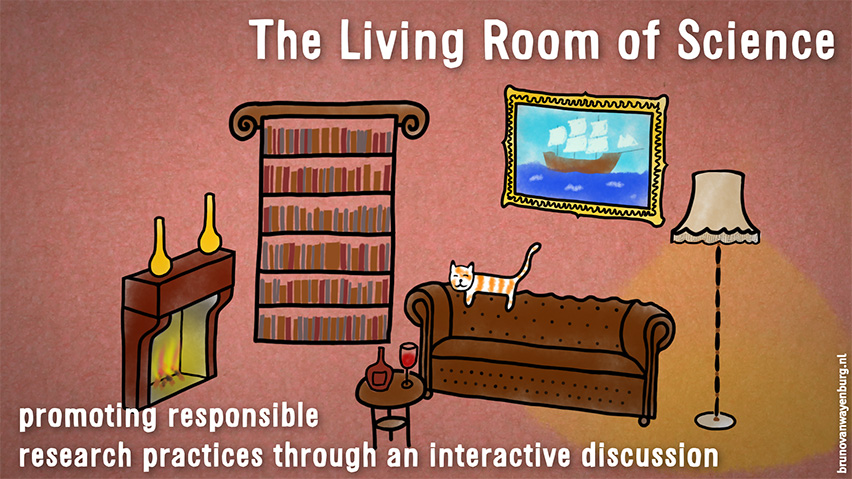Livingroom of Science
Science is a dynamic process with continuously developing, often implicit rules and attitudes. Proclamations such as “this is how we always do it”, “get used to it", or "this is what it takes to grow in academia” occur more frequently than they ideally should.
The contemporary debate about appropriate scientific practices is fierce, lively and has amplified to non-academic domains. Hence, the debate is not solely driven by objective information anymore, but rather it is charged with emotions. How we conduct ourselves and (equally important) how we inform and educate young scientists will therefore not only be essential to sound scientific progress, but also to how science is seen and valued by the public at large.
In this project “Living Room of Science”, I have collected all my attempts and initiatives to improve science as a whole. Below you can find all scientific output related to these initiatives. Also, I have presented several times on this topic.
Ongoing
The call for replication studies is stronger than ever before. Particularly since the replication crisis has struck the field of Psychology (Open Science Collaboration, 2012, 2015), producing replications are considered a more urgent project. With Marielle Zondervan and Herbert Hoijtink, we are working on Bayesian tools to directly test for a replication effect. Together with Lars Tummers, Stephan Grimmelickhuijsen and Sonja Winter, I am applying such methods to data on questionable research practices among PhD-students and how deans think about this. Papers on these topics will be published on this website, as soon as they have been accepted for publication.
One of the difficulties of implementing responsible research practices, is that rules and traditions on such practices differ between individual scholars and research disciplines. Most of the rules that do exist are subjective and in fact ‘unwritten’ rules that make them difficult to grasp for early career scientists.
We propose to organize an online platform for sharing knowledge on responsible research practices. This platform will encourage early career scientists to choose their own path with less dependency on their discipline-specific rules and habits: no longer excuses like “this is simply how we always do it”. Knowledge about appropriate research practices will increase amongst participants through the interaction with scientists and forming informed opinions by collecting views from various disciplines.
This platform will result in a helicopter view on the scientific field as a whole. The expressed views will lead to concrete guidelines on how to improve sub-optimal research practices. This platform will also lead to insight in the differences between distinct disciplines: are the currently heard proclamations on specific practices necessary or the result of habits that we need to get rid of.
This knowledge will be made available to the general public and therefore create awareness for a science that is striving to improve itself. The online platform will show an active community of young scholars who are willing to listen to other disciplines and work on improving the academic mores. The established recommended practices will eventually be published in a book. To raise awareness for our website, we received funding from an internal Young Academy project proposal which makes it possible to create a real-life living room (i.e. chesterfield couch, floor lamp, carpet and ipads/LCD screens) and use it as a stand at various relevant conferences and public scientific gatherings.
This project is part of the ‘freshman project’ of the 2016-class of the Young Dutch Academy of Sciences, part of the Royal Dutch Academy of Sciences (KNAW).
Completed
Bayesian statistical methods are slowly wriggling into all fields of science. More specifically, they becoming popular in applied research (Van de Schoot et al, 2016).
Although it is very attractive to use Bayesian statistics, my personal experience has led me to believe that naively applying Bayesian methods can be dangerous for at least three main reasons: (1) the potential influence of priors, (2) misinterpretation of Bayesian features and results, and (3) improper reporting of Bayesian results. To deal with these three points of potential misjudgments, together with Sarah Depaoli, I have developed the succinct WAMBS-checklist: the “When to worry and how to Avoid the Misuse of Bayesian Statistics”-checklist.
The purpose of the questionnaire is to describe 10 main points that should be thoroughly checked when applying Bayesian analysis. Also, the use of Bayes Factors can lead to instrumental optimization of Bayes factors (i.e., “BF-hacking”) similar to the phenomenon of p-hacking in traditional NHST, especially when dichotomous cut-off values for evidentiary power (and thus “publishability”) are set. In line with the famous quote of Rosnow and Rosenthal (1989, p. 1277), we argue that “God would love a Bayes Factor of 3.01 nearly as much as a BF of 2.99”.
Willem Koops and I examined differential student motives among students from a social sciences bachelor’s degree at Utrecht University, and whether this difference related to participating in educational programs for broader intellectual formation (Bildung). We concluded that respondents participating in a program for broader intellectual formation or aspiring a research master’s degree program generally scored higher on Bildung and lower on vocational preparation compared to students who were not.
I carried out several projects with Hans Sonneveld, director of the Netherlands Centre of Expertise for Doctoral education, on career trajectories and experiences in academia:
- From a PhD to What? The Importance of the education-employment transition: Lessons from the Netherlands
- Unemployment among Doctoral Recipients
- employment status of doctoral recipients
- Gender Inequality in the Dutch PhD system
- Mobility of Innovative Subsidies (commissioned by NWO): a replication study with the most recent cohort is currently being carried out;
- Efficiency of social sciences subsidies (in opdracht van NWO-MagW)
- Explaining PhD Delays among Doctoral Candidates
- PhD monitor 2011: PhD from Utrecht University (CvB UU)
Trajectories and Labour Market Mobility (ministry OC&W)
In her PhD project, Mariëlle focuses on including prior knowledge in statistical analyses (informative Bayesian research) and confronting prior knowledge with new data.




















